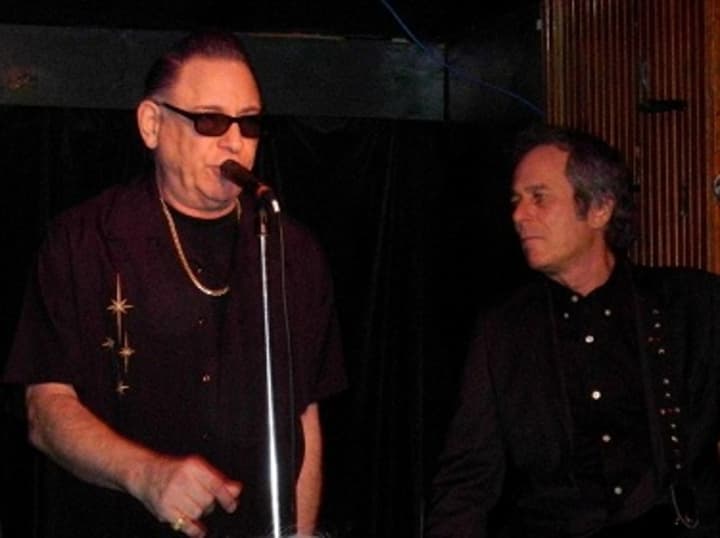Imagine a professor coming to class without a syllabus, no lesson plan, relying on what he knows, winging it as he goes. Or a comedian doing an hour-and-a-half of improv.
The difference is that a solo act can get away with it most — if not all — of the time.
But when two-thirds of your back-up band are fill-ins, even the presence of bassist Rockin’ Rob Stoner can’t keep it all together.
The professor example is fitting, given that a dozen and a half of the attendees at Thursday night’s show at the Turning Point in Piermont were SUNY Purchase undergrads and Rockland Community College students getting a rock-and-roll history lesson, courtesy of instructor Richard Corcoran.
Gordon is one of a rare breed – an interpreter of others’ rock-and-roll, rockabilly and country-rock tunes. He emerged from the punk explosion of the late 70s, first as the frontman for Tuff Darts, then as a retro-rocker with Link Wray on guitar, singing songs that were more than 20 years old.
With the exception of Gordon, Stevens and, to be fair, Cyndi Lauper (remember Blue Angel?), the neo-rockabilly movement was about bands – the Rockats, the Stray Cats, Buzz and the Flyers, Matchbox, the Polecats and more. So Gordon was something of an anomaly.
Even though the Pointer Sisters had a radio smash with “Fire,” Bruce Springsteen actually wrote the song for Gordon, who recorded it first (and, to these ears, delivered it much better). He also did a bang-up version of Marshall Crenshaw’s “Someday Someway.”
Still, it was his cover versions of seminal rockabilly rave-ups – “Red Hot” by Billy Lee Riley, “Rock Billy Boogie” by Johnny Burnette and “Black Slacks” by the Sparkletones – that thrilled hepcat purists.
And while these didn’t make him famous, they gave him enough nickels to rub together.
“I’ve been slugging it out since I was 15, trying to get by,” he told me in 1997, after he’d turned 50. “I’ve been there and back…It’s frustrating as hell, and it’s scary — you’re always living on the edge. But I just love it, man.
“I’ve been able to do what I enjoy doing and not have to worry about the rent.”
Here, 15 years later, Gordon’s voice is strong and commanding as ever, still that perfect blend of Conway Twitty’s bass and Elvis’ quiver.
He’s dropped a few pounds the past decade or so, and the Eraserhead top is long gone. But Gordon clearly enjoys singing the same tunes he’s been crooning for 3½ decades.
He was also genuinely grateful for the evening’s enthusiastic response, at a club he’s played more than five dozen times over the years.
Although the 20+-song set had a few awkward choices (Dale Hawkins’ “Suzie Q,” Brenda Lee’s “Sweet Nothings,” the painfully lame “Rock Therapy”), Gordon played discerning archivist:
After announcing he was going to do an Elvis Presley tune, he broke into the lesser-known but hot, steamy, swingin’ “A Mess of Blues” (Doc Pomus, Mort Shuman).
For some, the Willie Nelson-Faron Young chestnut, “Hello Walls,” was just as luscious a treat.
Then there was Hawkins’ “Little Pig,” spun in a slower, groovier swing than the more familiar retro-rock version by Buzz and the Flyers.
Some of the students tapped their feet or bopped their heads. Most watched without flinching, however. Meanwhile, the much older set boogied in their seats.
It was a fun time, for the most part, but it was hardly a lesson worth time-capsuling.
The baby-faced drummer, unfortunately fell behind now and then – though, to his credit he recovered quickly.
“You remember that one, Bernie,” Gordon teased at one point, “the one your mother taught you…”
Meantime, Stoner and the lead guitarist at times played in different keys, at one point prompting Gordon to scrap Leroy Van Dyke’s “Walk On By” a few bars into the song.
No one was mistaking the ax-man-du-nuit for Wray, Danny Gatton or Gordon’s on-again, off-again sidekick, Chris Spedding. This guy was too busy trying to play guitar hero on the bottom three strings to bother with evoking the guttural twang of true rockabilly. Somewhere, a Rush tribute band is missing a fretman.
It even rubbed off on Stoner – a professor himself.
While Gordon took a break after a dozen songs, Stoner tore into an extended bass riff on “Long Tall Sally” (one in a trio of mailed-in rock and roll “classics”), playing from above the fretboard, then putting the bass behind his head — not once but twice.
“Light it on fire,” someone shouted.(OK, it was me.)
The breather did Gordon good. He came back strong with “Little Sister,” and Don Gibson’s “Sea of Heartbreak.” Still, some of the remaining tunes either petered out at the end or simply fell off the table -- through no fault of his.
Yes, genuine rock and roll cover bands are dwindling these days. Trouble is, you don’t expect Robert Gordon to be their lead singer.
Click here to follow Daily Voice Orangetown and receive free news updates.


